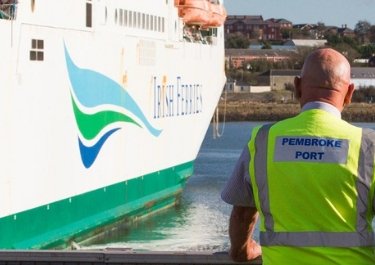As featured in the Port's newsletter, OnBoard, Autumn 2017.
 For millennia, humanity has plied the narrow Irish Sea to and from Wales for exploration, trade, plunder and conquest. Today, what has become a vital maritime link in a seamless logistical chain that stretches from Ireland to the east European continent is kept going by the men and women of Pembroke Dock Ferry Terminal.
For millennia, humanity has plied the narrow Irish Sea to and from Wales for exploration, trade, plunder and conquest. Today, what has become a vital maritime link in a seamless logistical chain that stretches from Ireland to the east European continent is kept going by the men and women of Pembroke Dock Ferry Terminal.
Their ability to shift hundreds of thousands of tonnes of freight and around a third of a million people on and off ferries each year, is relied upon by regional and national economies alike.
There are few places in Wales where, in just a few minutes, you can take the pulse of another nation’s economy. The expansive marshalling yard at Pembroke Dock Ferry Terminal is one such place. Here you get a pretty decent grasp of Ireland’s state of economic health.
The Milford Haven Waterway is a vital trade artery for Europe’s westernmost nation, and the ferry terminal at Pembroke Dock (the busiest in South Wales) fairly hums when Ireland is busy at work. Shift supervisor Clive Butland has had his finger on that pulse for nearly 39 years. He’s the longest serving member of the team at the Port of Milford Haven’s Pembroke Dock Ferry Terminal.
“Back in 1979 I started working when it was B&I Ferries. They became Irish Ferries and barring a short break, there’s been a service running from here ever since,” recalls Clive. “Whenever Ireland was booming you saw timber and lots of steel going over there… Lots of steel,” he emphasises. “And when Ireland is doing well, so does the port.” He points to the top yard, where perhaps millions of pounds worth of products, materials and equipment have been arriving on trucks over the past hours, ahead of the second of two daily sailings to Rosslare that depart from here.
Clive has only a brief moment to reminisce as he waits for his team to line up. It’s a little before midday and he is standing on the marshalling yard at Pembroke Port, clipboard in hand. Behind him in the upper yard are row upon row of lorry trailers, now separated from their hauling trucks.
This is drop freight. Truck drivers who’ve transported their articulated loads here from across the UK and Europe, have come through the Port of Milford Haven’s security checkpoints and unhitched their valuable cargos. In just over an hour, the orphaned units will be put on the ferry by Clive and his team using special tractor units called Tugmasters. But not before that team has emptied the ferry full of freight coming over from Ireland.
“Drop freight is perfect for us,” explains Clive. “My guys know how to get trailers on a ship and load it right, and I’m not chasing truck drivers all the time.”
Clive starts directing his team to move drop trailers further down the yard to be close to the arriving ferry. His drivers in their Tugmasters move like well-trained retrievers, quartering, collecting and dropping their quarry in perfect rows on the lower yards, before coming back for their next instructions.
This leaves space on the top yard for drop trailers of exports coming in fresh from Ireland, which will be picked up by hauliers before heading off landside, towards continental Europe.
At 12.45, the Irish Ferries ship, Isle of Inishmore, swings into her berth. Manager of the Ferry Terminal, Mike Lewis supervises as his team, out of their cabs now, switch to their linesman roles. Lines thrown from the ferry are made fast and within five minutes the giant ramps of the £38m two tier road link to the ship are lowered into place.
Mike is rightfully proud of his operation. He has been here 37 years, having started working on the decks for B&I back in 1980. While this may shout ‘disco’ to some of you, what it means is that Mike knows this operation like the back of his hand. “If you cut me in half you will see Ferry Terminal written on the inside,” he jokes. “I understand what everybody’s job is, and what it entails,” he adds.
It’s this accumulated experience of Mike and his team that delivers an outstanding service for ferry operators. “If a ship is late because of heavy seas then we make up the time. We saved them forty minutes last night,” says Mike.
Of course, it’s not just drop freight the team is handling. Full articulated lorries and, in the summer season, hundreds of cars and caravans, make their way to and from Ireland through this port.
With Brexit looming there is some uncertainty here. Talk of a soft border in Northern Ireland, and of new customs and border checks being installed here, leave the team unsure of the future. Pembrokeshire’s historic link with Ireland predates the EU of course, but you get a clear reminder of how international trade matters here in West Wales. “Ireland’s business is our business,” says Mike, and with up to 30 lorries full of loo roll passing through here each week, he’s not wrong.


